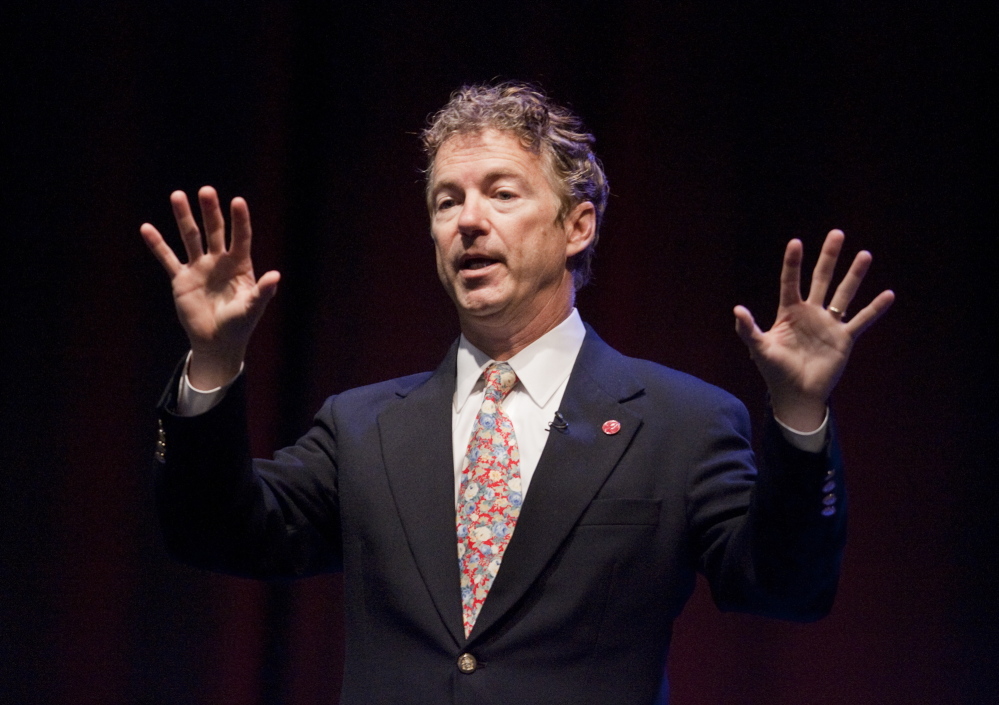BANGOR — In a forceful and at times accusatory address at the Maine Republican Party convention, Gov. Paul LePage on Saturday cast himself as the state’s best hope to combat the crush of ineffective and backward liberal policies that he has fought against since taking office in 2011.
Reiterating his commitment to fostering economic growth, clamping down on welfare abuse, and stopping the flow of dangerous illegal drugs into the state, LePage struck a confrontational tone for the beginning of his re-election campaign, in which he will face Democratic U.S. Rep. Mike Michaud and independent Eliot Cutler.
To his opponents, LePage issued a challenge by way of a raspy growl that boomed through the Cross Insurance Center:
“This will be probably the nastiest campaign you’ve ever seen in the state of Maine,” LePage said. “The national unions have picked me as the number two man to throw out. You know what I say to that? Bring it on.”
The crowd of party loyalists erupted in cheers – one of the many applause lines in a speech the governor peppered with familiar condemnations and a litany of his accomplishments.
Touting his economic success, LePage said Maine’s unemployment rate, at 5.9 percent, is lower than the national average and that of many other states, and that his administration has helped create 18,000 new jobs since 2010. LePage also said his tax cut of roughly $403 million has generated a return of $77 million in new revenue, while a sales tax increase ushered in by Democrats generated only $3 million.
His proudest accomplishment, LePage said, was repaying $750 million in Medicaid debt owed to Maine hospitals.
Pivoting to the campaign and the policies of his opponents, LePage was not shy in calling them out by name and painting a vivid picture of what a Democratic or independent governor would mean for Mainers.
“While I’ve been … putting money back into your pockets, I assure you, Mike Michaud and Eliot Cutler will pick your pockets,” LePage said. “Neither will hesitate to increase taxes, to raise spending, whether we need it or not.”
The criticism of his challengers took on a personal tone at one point.
“I get accused by my liberal opponents and the liberal press that I’m waging war on the poor,” said LePage, who was once homeless as a boy. “Let me tell you, until those guys walk in these shoes, they have no business talking.”
LePage’s speech was the last of the convention. Compared to the uprising four years ago led by U.S. Rep. Ron Paul and a tea party faction that ushered then-Waterville Mayor LePage’s name onto the ballot, this weekend’s gathering was a relatively mild reiteration of the party’s core beliefs.
Earlier Saturday, Paul’s son, U.S. Sen. Rand Paul, R-Ky., a conservative favorite and possible 2016 presidential candidate, delivered a keynote address peppered with humor, policy recommendations and what may be a preview of the national party’s strategy to take back the White House.
He said conservatives must make a concerted pitch to the nation’s unemployed, the economically downtrodden and the largely non-white urban population centers.
These traditional bastions of Democratic support were part of the voting blocs that helped President Obama win re-election in 2012.
“For those who are living in poverty, we need a specific message for them,” Paul said. “As far as how we do this, do it with a smile. We’ve got to have optimism. We have to bring optimism to people.”
Beyond hinting at his party’s larger strategy, Paul emphasized in his address that America’s best chance at prosperity is to cut wasteful federal spending, and he said Republicans are the ones to do it.
He said many politicians in Washington are either too afraid, or too cowed by special interests, to stand up against wasteful spending.
Dressed in a dark sport coat, white shirt and patterned tie, Paul held forth to a rapt convention crowd for more than 25 minutes, taking aim at all manner of policy and spending ills.
He often elicited laughter before delivering precise critiques of waste, including an anecdote about a recent vote in the U.S. House of Representatives on a $3 million federally funded TV advertising campaign in which the image of a water-skiing squirrel named Twiggy is used to sell American-grown walnuts to people in Spain.
In an overwhelming, bipartisan vote, 320 House members voted to continue to pay for Twiggy’s antics.
“It isn’t so much about the program or the $3 million,” Paul said. “If you don’t have the courage to cut $3 million, how are you going to tackle (difficult cuts to entitlements such as) Social Security, Medicaid?”
Paul didn’t spare Republicans in his criticism. He took aim at the reluctance of both parties to cut roughly $20 billion in annual spending that he called corporate welfare.
“How can Republicans, with a straight face, say we’re willing to cut off areas that are sensitive to people, without cutting off the welfare to big corporations?” Paul asked.
Recalling the government shutdown that spanned 17 days and ended on Oct. 17, 2013, Paul said the point Republicans tried to illustrate when they closed most government offices remains lost.
“There’s good news and bad news. The good news is your government’s back open. The bad news is your government is back open,” Paul said. “Nothing’s changed. We’re borrowing more than a million dollars a minute.”
Paul also seemed to test talking points for a possible future presidential campaign. He sharply criticized then-Secretary of State Hillary Clinton’s handling of the attacks on the U.S. mission in Benghazi, Libya, in 2012, when armed men attacked the compound on the anniversary of 9/11, killing Ambassador Christopher Stevens and three other Americans.
“I think Hillary Clinton’s conduct in Benghazi precludes herself from ever holding high office in this country,” Paul said.
Before Paul took the stage, fellow U.S. Sen. Susan Collins, R-Maine, delivered a scathing critique of the Obama administration.
To the cheers of an exuberant crowd of Republican state delegates and supporters at the state convention, Collins, who is seeking re-election this year, decried what she said was Obama’s flouting of the U.S. Constitution’s separation of powers.
She railed against the Affordable Care Act; Obama’s recess appointments to the federal bench when the Senate remained in session; the Obama administration’s misuse of the Internal Revenue Service to target conservative groups; and what she called runaway federal spending.
All of these offenses amount to a trend of presidential overreach, she said.
“A basic constitutional principle is the separation of powers between the three branches of government,” Collins said. “Yet President Barack Obama routinely disregards this principle – ironic for a former constitutional law professor.”
Matt Byrne can be contacted at 791-6303 or at:
mbyrne@pressherald.com
Twitter: MattByrnePPH
Copy the Story LinkSend questions/comments to the editors.





Success. Please wait for the page to reload. If the page does not reload within 5 seconds, please refresh the page.
Enter your email and password to access comments.
Hi, to comment on stories you must . This profile is in addition to your subscription and website login.
Already have a commenting profile? .
Invalid username/password.
Please check your email to confirm and complete your registration.
Only subscribers are eligible to post comments. Please subscribe or login first for digital access. Here’s why.
Use the form below to reset your password. When you've submitted your account email, we will send an email with a reset code.